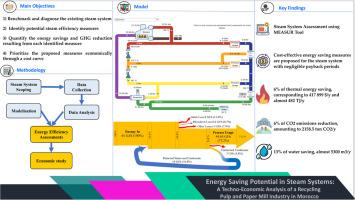蒸汽系统的节能潜力:摩洛哥一家回收纸浆和造纸厂的技术经济分析
IF 2.7
Q2 MULTIDISCIPLINARY SCIENCES
引用次数: 0
摘要
工业部门占全球能源消耗的近 40%,其中蒸汽系统占制造业能源消耗的 30%。在非洲和全球能源转型过程中,对清洁工艺的需求不断加强,因此采用提高能效的做法势在必行。各国政府正在重点减少以化石燃料为主的制造业的能源损耗,这些行业是温室气体的主要排放源。尽管能耗巨大,但在降低成本和排放的努力中,工业热力流程往往被忽视。为了解决这一问题,本研究通过对摩洛哥一家回收纸浆和造纸厂进行技术经济分析,对热能流程进行了研究,并确定了蒸汽系统中的节能机会。这是第一项专门针对该国特定行业蒸汽系统的研究。研究采用系统方法,涵盖蒸汽的产生、分配、最终使用和回收。通过评级问卷对当前系统进行了基准测试,提出的节能措施包括泄漏维修、管道保温、排污管理和提高锅炉燃烧效率。一项经济研究评估了这些机会的成本效益。研究结果显示,热能消耗减少了 6%,每年可节约 417 899 美元和近 482 太焦耳(TJ),温室气体排放量减少了 6%(每年减少 2158.5 吨二氧化碳),每年可节约用水约 5300 立方米(13%)。总投资 8750 美元,投资回收期可忽略不计。尽管工业活动多种多样,但由于蒸汽系统的基本组件被广泛共享,这项工作对其他工业也很有用。此外,它还为提高工业能效提供了切实可行的见解和建议,从而为非洲联盟 2063 年议程和联合国可持续发展目标提供了支持。本文章由计算机程序翻译,如有差异,请以英文原文为准。

Energy saving potential in steam systems: A techno-economic analysis of a recycling pulp and paper mill industry in Morocco
The industrial sector represents nearly 40 % of global energy consumption, with steam systems accounting for 30 % of energy use in manufacturing. As the need for cleaner processes intensifies within African and global energy transitions, adopting energy efficiency practices becomes imperative. Governments are focusing on reducing energy losses in fossil fuel-dominated manufacturing industries, which are major producers of greenhouse gas emissions. Despite their significant energy consumption, industrial heat processes are often overlooked in efforts to reduce costs and emissions. To address this, the study examines thermal energy processes and identifies energy-saving opportunities within steam systems through a techno-economic analysis of a recycling pulp and paper mill in Morocco. This is the first study focusing specifically on steam systems within a particular industry in the country. The research uses a system approach covering steam generation, distribution, end-use, and recovery. The current system is benchmarked through a rating questionnaire, and proposed energy-saving actions include leak repair, pipe insulation, blowdown management, and improved boiler combustion efficiency. An economic study evaluates the cost-effectiveness of these opportunities. Findings reveal a 6 % reduction in thermal energy consumption, annual savings of $417 899 and nearly 482 TJ, a 6 % decrease in GHG emissions (2158.5 tons of CO2 per year), and water savings of approximately 5300 m³ per year (13 %). The total investment of $8750 has negligible payback periods. Despite diverse industrial activities, this work is useful for other industries since the fundamental components of the steam system are widely shared. Moreover, it supports the African Union's Agenda 2063 and United Nations Sustainable Development Goals by providing practical insights and recommendations for enhancing industrial energy efficiency.
求助全文
通过发布文献求助,成功后即可免费获取论文全文。
去求助
来源期刊

Scientific African
Multidisciplinary-Multidisciplinary
CiteScore
5.60
自引率
3.40%
发文量
332
审稿时长
10 weeks
 求助内容:
求助内容: 应助结果提醒方式:
应助结果提醒方式:


